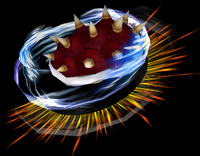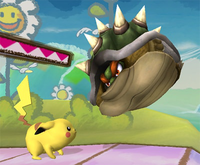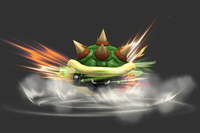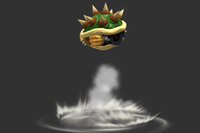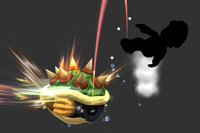Whirling Fortress
| Whirling Fortress | |
|---|---|
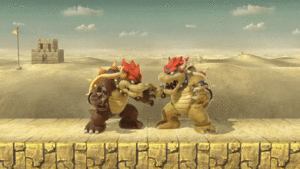 Whirling Fortress in Ultimate. | |
| Users | Bowser Giga Bowser |
| Universe | Mario |
Whirling Fortress (スピニングシェル, Spinning Shell) is Bowser's up special move.
Overview[edit]
When using Whirling Fortress, Bowser retreats into his shell and spins rapidly while damaging nearby foes. Prior to Super Smash Bros. 4 the grounded version consists of two hits, but after Smash 4 it is a multi-hitting attack, whereas the aerial version has always been a multi-hitting attack in all games. It is similar in execution to Donkey Kong's Spinning Kong, being a move that makes the user quickly spin around with a mostly-horizontal recovery, though in later games the two have been somewhat differentiated. The move has very low startup lag in every game (especially compared to the rest of Bowser's moveset), which makes it a notoriously strong out of shield option in every Smash title, being a key part of how Bowser gets out of disadvantageous game states.
This special attack is shared by Giga Bowser, both in his boss appearance in Super Smash Bros. Melee and in his playable appearance in Super Smash Bros. Brawl and Super Smash Bros. 4. It grants him multiple frames of invincibility, making it difficult to attack him out of the move. In Melee, Giga Bowser's Fortress also gave him much more vertical recovery when used in midair, and the ground attack can deliver multiple hits to nearby opponents; in Brawl, however, the ground attack only deals up to two hits, reducing its overall damage output.
In Super Smash Bros. Melee[edit]
In Melee, Whirling Fortress is known for the defensive and maneuvering attributes it adds to Bowser's gameplan, filling several holes in his otherwise slow moveset. As a result, it is widely regarded as one of Bowser’s few saving graces as a character. Several unique properties make it highly beneficial to Bowser's kit;
- It has very little start-up (4 frames), during which Bowser is invincible, and has relatively little cooldown lag.
- Bowser cannot get shield grabbed if used in sequence.
- It hits throughout most of its animation (on the ground).
- It allows Bowser to move quickly and suddenly in one direction, being much faster than his normal movement speed.
- It has high knockback on the ground, and inflicts high damage in the air (32% if all hits connect perfectly).
- It can be used to edgeguard quickly and efficiently. Spinning off the side of a stage leads directly to an edgehog, known as Fortress hogging.
The above properties make Melee's iteration of Whirling Fortress a versatile move. It can also be used as a damaging and effective replacement to Bowser's quick but laggy roll, jump-canceled out of shield to discourage overly aggressive opponents, and clank with an opponent's move with decent timing. However, the ground attack can only deal up to two hits, and if any of the hits get blocked, Bowser will be highly vulnerable to punishment by his opponents, which includes getting grabbed. As a result, the ground attack is not safe to use against shields.
Fortress hogging[edit]
Fortress hogging is a technique in Melee and to a lesser extent in Brawl that allows Bowser to grab onto the edge after simply using his Whirling Fortress on the stage. It was popularised by MagnuM. Fortress hogging is performed by timing the Whirling Fortress so that the end of the animation allows Bowser to fall past the stage and in turn, grab on to the edge. However, on stages where there are sloped edges, like Yoshi's Story, Bowser will automatically Fortress hog onto the edge regardless of the position he is facing, given he is not facing away from the stage after falling.
Fortress hogging is useful for quickly edgehogging a recovering opponent, greatly assisting in his edgeguarding-centric game plan. Quickly reaching the ledge after knocking a foe back, against characters launched lower and forced to go to the ledge, it can be hard to challenge. Naturally, it can also be used defensively, making use of ledge intangibility to stave off pressure. Using Whirling Fortress for these roles is much, much faster than running or jumping, and the hitboxes can make it somewhat difficult to contest.
In Super Smash Bros. Brawl[edit]
In Super Smash Bros. Brawl, Whirling Fortress has seen multiple changes, both positive and negative. One negative change with both versions is that the move comes out one frame later on frame 6. This barely affects the move at all. The grounded version has an additional frame of intangibility to make up for its slower startup lag. In addition to this, the move can now be performed on the first frame of Bowser's jumpsquat (rather than the second frame), which means that it can still be performed just as quickly out of shield and, Bowser can now become intangible on frame 1 OoS, rather than frame 2, making it a better escape option OoS. One positive change with both versions is that they have more range. This especially helps the grounded version, as it has more range to punish moves from further away, allowing it to punish even more moves OoS.
The grounded version of the move has seen a rather significant nerf. The first hit is considerably weaker, dealing less damage (11% down from 13%) and knockback. It does not KO Mario on Final Destination until 131% without DI, although as the move has vertical knockback, it can KO fast fallers just as, if not earlier than it could before, due to the universally decreased falling speeds and the introduction of the gravity penalty. As the move has lower base knockback, it can also be unsafe on hit at lower percents in some situations. The second hit has a shorter hitbox duration, which can make it harder to land from far distances.
The way the grounded version handles momentum has been changed. Previously, it was largely based on stick position, so if the player let go of the control stick, they would stop moving. In Brawl however, if the player lets go of the stick, they will keep moving. This also makes turning less sharp than it was before.
The aerial version has seen a few changes of its own. Despite its higher startup lag and slightly larger hitboxes, the hitboxes are largely identical to how they were before, dealing an even higher amount of damage due to the changes to stale move negation. The aerial version travels slightly higher than it could before and Bowser can now grab ledges while he is rising (at least if he is facing them), which makes it a better recovery move overall. The move still does not go very high however, the multi hits can still easily be avoided and opponents can still easily hit Bowser out of it, so it still remains a poor recovery move overall.
A rather noticeable nerf the move has received is that it has much more landing lag, going from 10 frames to 50 frames. This makes it much more punishable if Bowser tries to recover high, or even if he just slides off a platform and then lands. Bowser can reduce this lag by landing just before he enters free fall, although he is still in a noticeable amount of lag if he lands before entering free fall. The move also now suffers from RCO lag, so Bowser receives additional landing lag if he hard lands at any point after using the move in the air. Bowser only gets four additional frames of hard landing lag however, and he does not get any extra lag from a soft landing or his aerials, so RCO overall does not hurt Whirling Fortress as much as some other recovery moves.
Another nerf the move received is that while Bowser can grab ledges from the front much sooner, he cannot grab ledges from behind until later. While this does hurt his recovery if he is facing away from the ledge, this mainly affects him when trying to perform Fortress Hogging (as the animation now has a fixed point when Bowser can grab ledges from behind). Fortress Hogging does still work if Bowser is facing the ledge, although the altered momentum the move has does make the execution different if he is further away from the ledge. If he is facing away from the ledge however, Bowser has less access to the technique. If he slides off the ledge too early, he will just fall down, often to his death on tournament legal stages. The only way he can grab the ledge is if he falls off late into the animation where it becomes much less useful.
Overall, Whirling Fortress on the ground is more versatile yet less rewarding out of shield option. While it is not as strong and Bowser cannot utilise Fortress Hogging as much, the move still has respectable KO power despite its reduced strength and its greater range makes it even easier to land, allowing the move to continue being one of Bowser's best moves. The aerial version is a better recovery move overall with slightly more range and it can grab ledges much earlier, although it still remains a very poor and exploitable recovery move, while also continuing to be a very poor attack on its own.
In Super Smash Bros. 4 onwards[edit]
In Super Smash Bros. 4, pressing the special move button repeatedly during the move—specifically after the initial rise for best results—will give Bowser marginally more height, somewhat similarly to Dr. Tornado. It also travels much faster and further than before. As an attack, the ground attack was reworked to deal multiple weak hits—up to 8, with the last hit delivering the most knockback instead of two strong hits—making its use as an out of shield option more reliable. The attack is also safer to use against shields, as the multiple hits make it harder for opponents to punish Bowser; they can still take the full impact of the final hit if they drop their shield too early. This trend continued into Ultimate, though its massive damage in the air was significantly nerfed.
Instructional quotes[edit]
| Spin on the ground to launch opponents skyward, or do it to get back onto the stage. | ||
| Get additional loft while airborne to make recoveries a snap. | ||
| Spin inside your shell, and hit foes with your spikes. | ||
| Ducks inside his shell and spins. Can be moved sideways while spinning. |
Customization[edit]
Special Move customization was added in Super Smash Bros. 4. These are the variations:
| 1. Whirling Fortress | 2. Flying Fortress | 3. Sliding Fortress |
|---|---|---|
| "Duck inside your shell and spin. You can move sideways while spinning." | "Spins high into the air but doesn't deal damage." | "Spin while sliding quickly to send opponents flying. Less vertical range." |
- Whirling Fortress: Default.
- Flying Fortress: Has slightly increased startup, making it slightly less effective out of shield, but increases vertical distance, to about twice the regular height, at the expense of horizontal distance and damage dealt. Launches foes sideways, only hitting once for 4% damage clean (contrary to its in-game description saying that it doesn't do any). Synergizes well with Dash Slash, where the Claw can move Bowser horizontally and then Flying Fortress to go vertically. However, when using this move while taking knockback, it won't rise as high or at all. Bowser also sustains slightly increased landing lag.
- Sliding Fortress: Increased horizontal distance, going as far as the entire stage of Battlefield on the ground, and 2/3 the length in the air. Only hits once, doing 6% damage and reduced knockback, however possesses a bigger hitbox, especially in the air. Takes longer to start up than the default move, making it less useful as a quick out of shield option. Also has increased endlag and landing lag as well. Less vertical reach than the standard version.
Origin[edit]
While unique to Smash Bros. as a whole move, Whirling Fortress is similar to how Koopas retreat into their shells when jumped on in the Super Mario series, which can be held and thrown or kicked by the Mario Bros. as a spinning attack. Ludwig von Koopa had a move similar to Whirling Fortress in Super Mario World. In Mario Kart: Double Dash!!, released a few years after Super Smash Bros. Melee, a special item called the "Bowser's Shell" was given to Bowser and Bowser Jr., featuring a large, spinning Bowser shell, vaguely similar to Whirling Fortress.
Despite the above, Bowser himself never used a move remotely like Whirling Fortress outside of Mario's Time Machine, where he would perform a move similar to Ludwig's attack in Super Mario World after being attacked, though this was not Nintendo-developed and likely didn't inspire the move. In fact, Bowser was never seen retreating into his shell in any Nintendo-developed game prior to the move's debut in Super Smash Bros. Melee. Like the Egg Roll and Green Missile, however, the move's concept later led back into the Nintendo-affiliated Mario series starting with an appearance as Bowser's defensive power shot in Mario Power Tennis, his shell-retreating move inMario & Luigi: Partners in Time and Bowser also has used the move in New Super Mario Bros U. In Super Paper Mario, Bowser performs a similar move in one of his Stylish Move animations, and in Mario Sports Mix. In Mario + Rabbids Kingdom Battle, Bowser (as MegaDragonBowser) uses the Whirling Fortress during the final phase of the final boss fight. Bowser also uses a similar move in Mario + Rabbids: Sparks of Hope for his dash and spinning animations.
Gallery[edit]
Whirling Fortress in Super Smash Bros. 4
